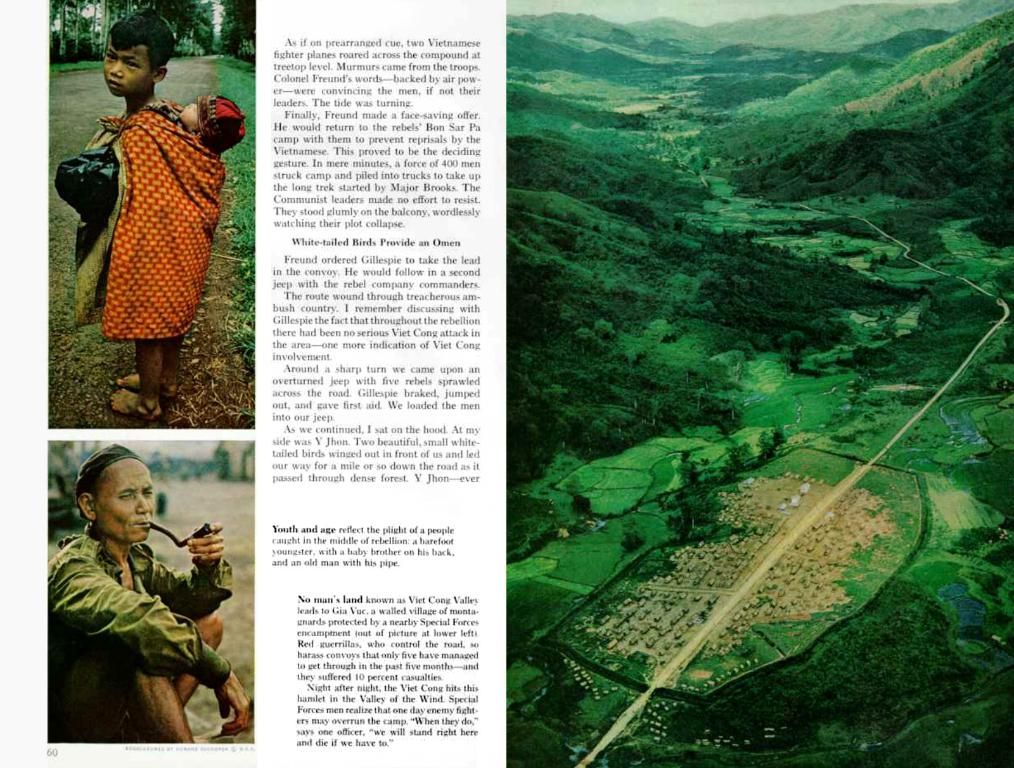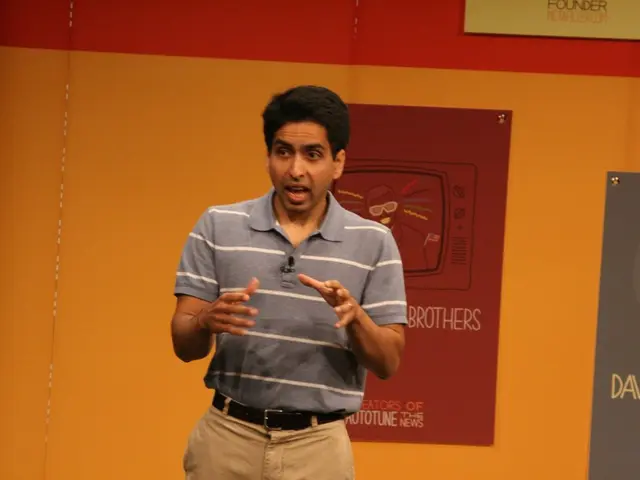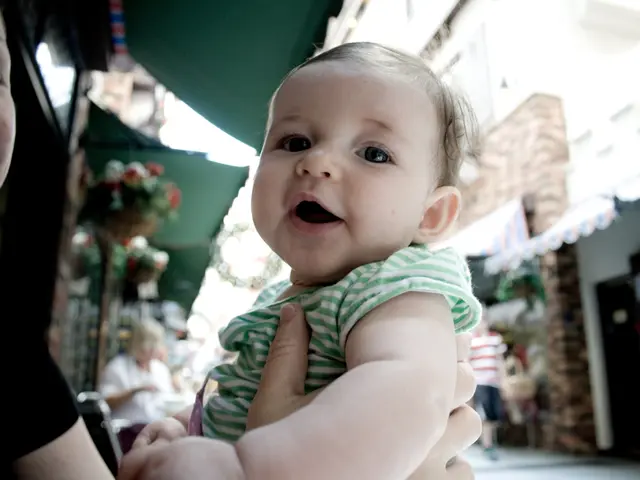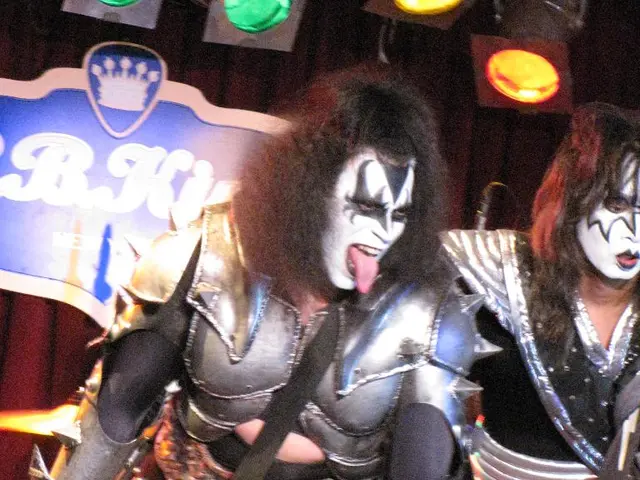Raw Energy and Controversy: The Rebirth of a Classic
By Abby Amoakuh
Sep 24, 2024 at 01:13 PM
Reading time: 2 minutes
Actor duo Jacob Elordi and Margot Robbie will lead the cast in Emerald Fennell's adaptation of Wuthering Heights, seemingly lacking ethnic diversity in its depiction.
🔗 Email | Facebook | WhatsApp | X | Flipboard | Copy Link
Australian heartthrobs Margot Robbie and Jacob Elordi are reigniting the flames of literary passion with their roles in the upcoming cinematic adaptation of Charlotte Brontë's masterpiece, Wuthering Heights. However, instead of ambient applause, this announcement elicited an uproar of criticism from the purist corners of the bookworm community. The crux of their dissent? The film's apparent disregard for racial authenticity and the whitewashing of the original novel's central racio-cultural tensions.
Wuthering Heights, an 1847 publication penned by Emily Brontë, centers around the tumultuous love story between Heathcliff, a misunderstood outsider, and Catherine Earnshaw. Heathcliff, of unknown origins, is characterized by the author as having a dark complexion and being of possible Romani or Indian descent. This intriguing choice by Brontë, a British writer from the mid-19th century, challenged social norms by incorporating themes of racial and cultural identity at a time when both were hotly debated and often racially-biased due to pseudoscientific beliefs.
The interplay of racial identity, cultural prejudices, and societal expectation forms the crux of Heathcliff's character in the novel, providing it with an intricate and revolutionary depth that has positioned Wuthering Heights as a timeless work of literature. Regrettably, numerous film adaptations have overlooked or entirely ignored this essential element of the story, further entrenching the normalization of erasing the narratives and experiences of people of color from mainstream media.
The 2011 film version partially mitigated this criticism by casting multiracial actors Solomon Glave and James Howson as the younger and older versions of Heathcliff, respectively. This choice was widely celebrated by modern Wuthering Heights enthusiasts as staying true to the character's original description. However, it appears that the upcoming film may take a step backward in this regard, as the lead role has reportedly been awarded to Caucasian actor Jacob Elordi. The online literary community's reaction was less than enthusiastic.
Many netizens perceived Elordi's casting as Heathcliff as a lackluster attempt to draw big names to the movie rather than finding actors who could infuse the character with the dark and brooding sensibility required to breathe life into such a profound exploration of emotions and morality.
Director Emerald Fennell has faced criticism in the past for her white-centric approach to storytelling and casting. Her 2020 film, Promising Young Woman, was heavily criticized for ignoring race and ultimately perpetuating the limitation of white femininity as the universal female experience. Fennell's 2023 film, Saltburn, showed a missed opportunity for genuine representation with her apparently feeble attempts to subvert class structures.
While casting decisions are often the result of a multitude of factors, including the director's vision, the actor's ability to portray the emotional depth of a character, and studio preferences, some critics see Fennell's decisions as indicating a lack of commitment to authentic representation. Though casting Jacob Elordi as Heathcliff may have provided her with a recognizable face to attract wider audiences, it remains to be seen whether the film will be able to capture the racial complexities that form an integral part of Brontë's timeless opus, thereby robbing the movie of its true potential.
Sparking Debate: The Making of Wuthering Heights
By Louis Shankar
Nov 5, 2024 at 07:32 AM
Reading time: 4 minutes
The upcoming cinematic adaptation of Charlotte Brontë's Wuthering Heights is stirring up a storm of opinions and controversy, with some calling it a fresh take on an enduring masterpiece and others lamenting the casting choices. This latest iteration comes five years after the last big-screen adaptation, which starred Tom Hardy as Heathcliff and Charlotte Riley as Catherine.
The excitement surrounding the new film is understandable; it brings together a cast of popular, talented actors, including Aussie stars Margot Robbie and Jacob Elordi. However, it's not just the star power that has fans buzzing. Director Emerald Fennell, who won an Academy Award for her script for Promising Young Woman, is known for bringing her distinctive, feminist spin to classic stories.
Yet, not everyone is on board with the new adaptation. Some critics have taken issue with the racial authenticity of the casting, particularly in the role of Heathclifff, which has traditionally been played by actors of color. In the original novel, Emily Brontë describes Heathcliff as being dark-skinned and having racially ambiguous features. Fennell's choice to cast Caucasian actor Jacob Elordi in the lead role has sparked discussion, with some arguing that it's a continuation of whitewashing in film adaptations of the novel.
Fennell's response to this criticism has been to emphasize that her version of Wuthering Heights is a reimagining rather than a direct adaptation. She has stated that her interpretation of the novel is more focused on exploring the complex dynamics of love, power, and control, rather than slavishly sticking to the racial descriptions in the book.
This approach has a long history in film adaptations of classic literature. Some directors, such as Tim Burton with his adaptation of Edward Scissorhands, have taken creative liberties to make the story more accessible and engaging for contemporary audiences. However, there is a fine line between creative interpretation and stripping the original work of its cultural and social context.
The casting choices in Wuthering Heights have also sparked conversations about the limitations of contemporary casting practices. In the literary world, discussions about whitewashing have been ongoing for years, with prominent examples such as the casting of Scarlett Johansson as Nakane in Ghost in the Shell and Tilda Swinton as the Ancient One in Doctor Strange. The issue is not only one of representation, but also one of perpetuating certain stereotypes and marginalizing individuals based on their race.
Director Emerald Fennell's vision for her adaptation of Wuthering Heights is undoubtedly ambitious and thought-provoking, but it has also polarized audiences. Some see it as a fresh take on an age-old story that speaks to new audiences, while others bemoan the erasure of important cultural nuances and the perpetuation of racial stereotypes. Only time will tell whether her interpretation of the novel is a groundbreaking reimagining or a misstep in a long history of problematic adaptation choices.
- In the midst of the controversy surrounding the upcoming adaptation of Charlotte Brontë's Wuthering Heights, critics are questioning the entertainment industry's ongoing support for movies-and-tv productions that overlook racial authenticity, as seen in the casting of Caucasian celebrities like Margot Robbie and Jacob Elordi.
- As debates about the importance of entertainment in accurately representing celebrities and their associated roles continue, the Wuthering Heights remake stands as a prime example of the entertainment industry's struggle to balance artistic freedom with maintaining racial authenticity and avoiding the whitewashing of classic characters such as Heathcliff.








